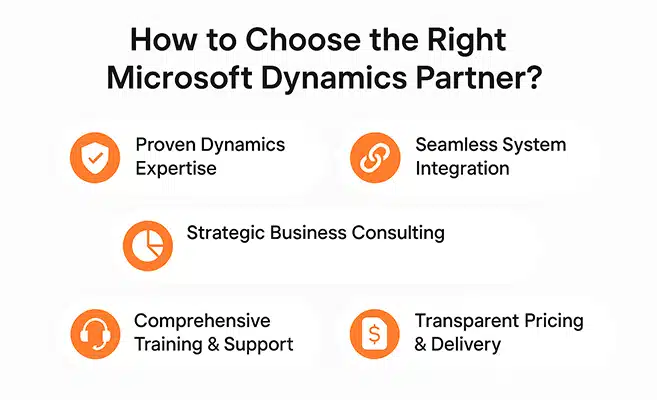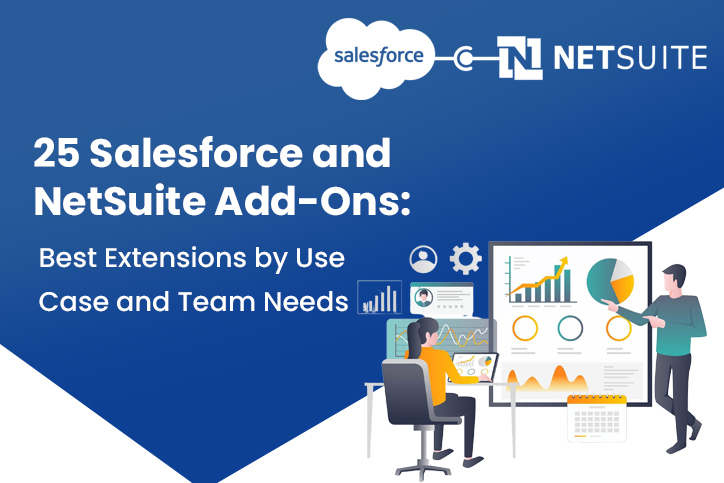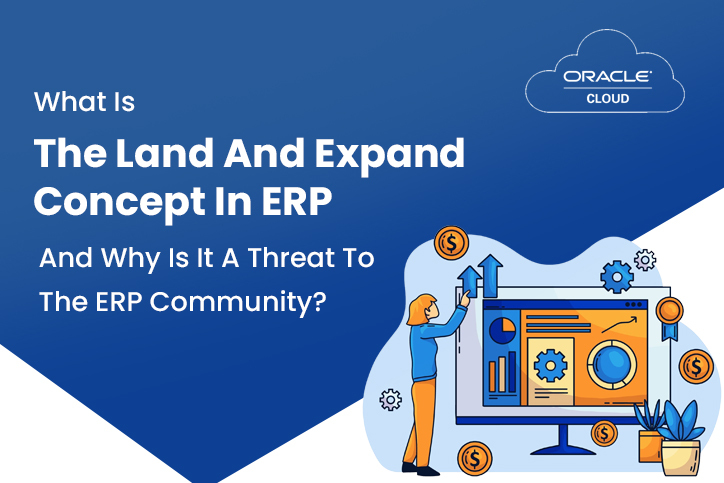Choose the Wrong Dynamics Partner? Don’t Wait Until Your Rollout Fails to Regret It
Implementing Microsoft Dynamics 365 Business Central is a transformative step for any enterprise. But this transformation hinges entirely on choosing the right partner. A mismatch can lead to missed deadlines, budget overruns, fragmented systems, and ultimately, a failed rollout. Conversely, the right Dynamics partner acts as a strategic extension of your team — delivering not only technical implementation but long-term business value.
This detailed guide is designed specifically for IT decision-makers, CIOs, and business leaders who want to understand how to choose the right Microsoft Dynamics partner to ensure a seamless, impactful, and future-ready ERP implementation.
Step-by-Step Guide: How to Choose the Right Microsoft Dynamics Partner
Follow this clear, methodical process for a confident partner selection:
Step 1: Define Your Business Objectives and Requirements
Start by clearly outlining what you want Dynamics 365 Business Central to achieve. Are you optimizing finance, streamlining operations, or preparing for international expansion? Clear goals will focus your search.
Step 2: Conduct Thorough Vendor Research and Shortlist
Leverage Microsoft’s partner directory, industry forums, and peer recommendations to create a list of potential partners like SoftArt known for their Dynamics 365 Business Central consulting services.
Step 3: Evaluate Technical Expertise and Cultural Fit
Schedule detailed technical discussions and site visits if possible. Assess their:
- Technical skills and certifications
- Understanding of your industry
- Communication style and company culture compatibility
Step 4: Request Detailed Proposals and Proof of Concept
Ask for proposals that include scope, timelines, costs, and risk mitigation plans. Where possible, pilot the solution or request demonstrations of similar deployments.
Step 5: Validate References and Performance Metrics
Contact past clients to understand their experiences—focus on project success, support responsiveness, and realized ROI.
Why Selecting the Right Microsoft Dynamics Partner is a Critical Business Decision?
Dynamics 365 Business Central is powerful—but complex. Success depends heavily on the expertise and approach of your implementation partner. This isn’t just about deploying software; it’s about aligning technology with your business processes, goals, and growth trajectory.
Choosing the right partner can:
- Accelerate time-to-value: Avoid common pitfalls and leverage proven methodologies to launch faster.
- Enhance system integration: Ensure Dynamics 365 Business Central integrates flawlessly with your existing applications, from CRM to financial systems.
- Provide strategic guidance: Transform your ERP from a tool to a strategic asset that supports decision-making and scalability.
- Minimize risks: Reduce disruptions, data migration issues, and change management challenges.
- Deliver ongoing value: Through continuous support, training, and optimization to maximize ROI.
On the other hand, selecting the wrong partner can leave you with a costly, underperforming system that frustrates users and wastes resources.
Essential Criteria for Choosing the Right Microsoft Dynamics Partner
Selecting your partner is a multi-faceted process that requires evaluating technical expertise, business alignment, and ongoing service capabilities. Here are the core factors to consider:
1. Proven Expertise in Dynamics 365 Business Central Consulting Services
Experience matters. Look for partners who have:
- Successfully delivered projects of similar size and complexity
- Microsoft certifications and partner designations demonstrating deep platform knowledge
- Strong capabilities in both cloud and hybrid deployments
- Case studies showing measurable business outcomes
Expertise in consulting means they can guide your company through best practices and tailor Dynamics to your unique needs.
2. Mastery of Dynamics 365 Business Central Integration
Your business ecosystem likely includes various software solutions—financial systems, CRMs, supply chain applications, or HR platforms. The right partner must:
- Demonstrate technical mastery in integrating Dynamics 365 Business Central seamlessly with these systems
- Use modern integration tools like APIs, middleware, or Microsoft Power Platform components
- Design integrations that are scalable and secure
- Provide documentation and training to ensure smooth handoffs and troubleshooting
Effective integration unlocks cross-departmental collaboration and real-time insights—crucial for data-driven decision-making.
3. Strategic Consulting and Industry Knowledge
A successful partner understands your industry challenges, compliance requirements, and operational goals. Their consulting approach should include:
- In-depth business process analysis before implementation
- Alignment of Dynamics 365 features with your strategic priorities
- Recommendations for workflow optimization and automation
- Future-proofing your solution to scale with your business growth
Partners who focus on business outcomes—not just technology—add far more value.
4. Comprehensive Support, Training, and Change Management
ERP success depends on user adoption. Your partner should provide:
- Customized training programs tailored to different user roles
- A structured change management plan to ease the transition
- Responsive post-implementation support, including troubleshooting and updates
- Continuous improvement cycles for system enhancements
Ongoing engagement ensures your teams use Dynamics effectively and that the system evolves with your needs.
5. Transparent Pricing Models and Strong Project Governance
Budget overruns and project delays are common in ERP implementations. To avoid them, insist on:
- Clear pricing structures without hidden costs
- Detailed project plans with milestones and deliverables
- Regular status updates and stakeholder communication
- Risk management and issue escalation protocols
Good project governance builds trust and keeps the rollout on track.
Common Challenges When Selecting a Microsoft Dynamics Partner and How to Avoid Them
Being aware of common pitfalls can save you time and money:
- Overpromising and Under-Delivering: Avoid partners who guarantee unrealistic timelines or “one-size-fits-all” solutions. Look for those who take time to understand your specific context.
- Lack of Industry Expertise: Generic implementations often fail to address sector-specific needs like compliance or unique workflows. Verify industry experience.
- Poor Communication: Regular, transparent communication is vital. A partner who hides issues or delays creates unnecessary risks.
- Limited Support Capabilities: Without robust post-launch support, small issues can become major roadblocks to productivity.
- Selecting Based on Lowest Price : The lowest pricing partner would eventually fail the project because either the project will be outsourced to meet the price range or junior resources will be deployed in the project
The Strategic Advantage of Partnering with SoftArt
SoftArt stands out as a premier Dynamics 365 Business Central partner by blending deep technical skills with strategic business consulting. Their expertise in Dynamics 365 Business Central integration ensures your ERP connects flawlessly with existing enterprise systems, unlocking unified data and operational agility.
SoftArt’s end-to-end consulting—from business analysis to post-deployment optimization—empowers enterprises to maximize their Microsoft investment while reducing risk and complexity.
Choosing SoftArt means gaining a trusted advisor committed to your long-term success, not just a vendor focused on deployment.
Why Integration is the Heartbeat of a Successful Dynamics 365 Business Central Implementation?
Integration transforms Dynamics 365 Business Central from a standalone ERP into the nerve center of your business. When integrated properly, it enables:
- Real-time data access across departments
- Automation of workflows that eliminate manual errors
- Scalability to incorporate future cloud applications and AI tools
A partner like SoftArt, experienced in complex integrations, ensures these benefits are realized without disruption.
Make Your Microsoft Dynamics Partner Choice Count!
Your Dynamics partner will be a critical driver of your digital transformation. By carefully evaluating expertise, integration capabilities, consulting approach, training, and project governance, you can avoid costly mistakes and unlock lasting business value. When you’re ready to engage with a partner who understands both the technical and strategic dimensions of Dynamics 365 Business Central, SoftArt is uniquely positioned to help you succeed.
Selecting the right Microsoft Dynamics partner transforms technology investment into a competitive advantage. Don’t wait until your rollout stalls — choose wisely, choose strategically.
Frequently Asked Questions:
Q. Why is choosing the right Microsoft Dynamics partner crucial for a successful ERP implementation?
Ans. Selecting the right partner ensures your Dynamics 365 Business Central solution is tailored to your business needs, integrated smoothly with existing systems, and supported long-term. The right partner minimizes risks, accelerates deployment, and maximizes ROI.
Q. What qualifications should I look for in a Dynamics 365 Business Central partner?
Ans. Look for partners with Microsoft certifications, proven industry experience, a strong track record of complex implementations, and expertise in integration and consulting services.
Q. How important is integration expertise when choosing a Dynamics partner?
Ans. Integration expertise is critical because your ERP must connect seamlessly with other business applications. Proper integration enables unified data, automation, and scalability essential for operational efficiency.
Q. How can a Dynamics partner help with change management and user adoption?
Ans. A good partner offers customized training, support resources, and change management strategies that help your team embrace new processes, reducing resistance and boosting productivity.
Q. What questions should I ask before finalizing a Microsoft Dynamics partner?
Ans. Ask about their past projects in your industry, their approach to integration and customization, support and training offerings, project governance, pricing transparency, and client references.









